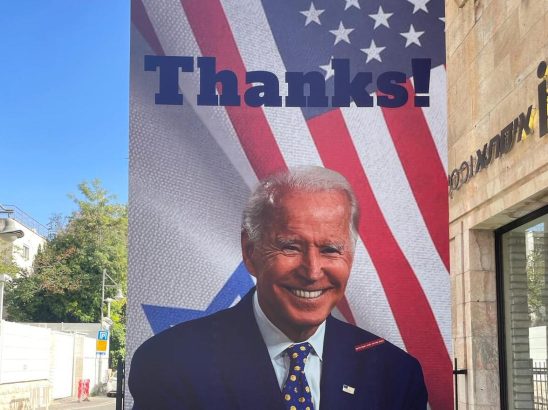With reports suggesting the Biden White House is considering unilateral recognition of a Palestinian state, Paul Gross argues such a move would be premature and not accepted by a majority of Israelis. Instead, Gross argues, Biden would be better pursuing the Saudi normalisation track, with its commitment to a future two state solution negotiated by Israel and the Palestinians.
In Jerusalem’s German Colony, a couple of miles from my home, there is currently a huge poster on display of Javier Milei, the markedly philosemitic and pro-Israel new President of Argentina, who recently visited Israel and pledged to move the Argentine Embassy to Jerusalem. The word ‘Thanks!’ is emblazoned in large letters on the poster.
Until a few weeks ago the ‘Thanks!’ poster was of United States Congresswoman Elise Stefanik, who presided over that congressional hearing on antisemitism, but the initiative began with the image of Joe Biden’s smiling face beaming down on passersby for several weeks, superimposed over a collage of the Israel and American flags. This followed his extraordinary speech a few days after the atrocities of 7 October (which even one conservative writer said ‘might be the most powerful statement in support of Israel ever delivered by any president’) and his subsequent visit to Israel.
It would be fair to say that the overwhelming and effusive gratitude to Biden from Israelis across the political spectrum has recently been replaced with more mixed emotions. When Itamar Ben Gvir told the Wall Street Journal, with trademark gaucheness, that Israel would be far better off with Donald Trump in the White House, he was probably not just speaking for the small minority of Israelis that usually agree with him. A great many Israelis were surprised and disappointed by what looked like a tone-deaf push for a Palestinian state, led by Washington.
This recent clarification from US Ambassador to Israel Jack Lew was therefore important – and welcome:‘We have never said there should be a unilateral recognition of a Palestinian state but rather an over-the-horizon process that includes a vision for a demilitarized Palestinian state.’
The Biden Administration is not wrong to see a huge opportunity in the clear message from Saudi Arabia that normalisation with Israel is still on the table, despite predictable anti-Israel fury on the Arab street. But that opportunity could well be missed if the President pushes for something unfeasible in the near-term – and opposed not just by Netanyahu and the right, but by the vast majority of Israelis in the wake of 7 October.
There is no need for the US to be more Catholic than the Pope here. Riyadh has not been insisting on an immediate return to two-state negotiations, but rather a ‘pathway’ to two-states. The moderate Sunni Arab states have no interest in the creation of another failed Arab state; a Palestine that falls to Hamas or other jihadists, or that collapses under the weight of corruption and kleptocracy – hallmarks of the Palestinian Authority for 30 years.
The Saudi ‘price’ for normalisation does not seem to require an urgent American push for Palestinian statehood, but rather clear commitments from Israel that it sees a two-state solution as the endgame, and that it will do what it can to make this easier rather than harder, while critical reforms of the PA take place.
Centrist Israeli leaders like Yair Lapid and Benny Gantz (and perhaps even some pragmatic Likudniks) could support a complete cessation of new building in settlements outside of the consensus ‘blocs’, support for the Palestinian economy, and a crackdown on settler violence. Meanwhile, Washington and regional Arab leaders can reassure Israel that no final status talks will even start until the PA has properly addressed corruption, and anti-Israel and antisemitic incitement in the media and education system.
There should be no expectation of any Israeli territorial concessions until there is a Palestinian leadership prepared to publicly declare – to its own people in Arabic – its support for the principle not just of ‘two states’, but of ‘two states for two peoples’. That the Jewish historical connection to this land is legitimate; and that Hamas and other terror groups are rejected as part of the Palestinian national movement. At present, the message from the PA is that October 7 was ‘a natural reaction’ to the ‘Nazi’ Israeli regime, and that Hamas is ‘part of the [Palestinian] national fabric’. PA and Hamas leaders are set to meet next week in Moscow – of all places – to talk ‘unity’.
The transition of Palestinian institutions and society to a national identity not based on complete rejection of Israel will take time; perhaps a generation or more. In the meantime, there should be nothing to stop Israel signing normalisation agreements with Saudi Arabia and other Arab and Muslim states likely to jump on the bandwagon; if those states know that Israel is committed to the political horizon of a two-state solution and will act accordingly.
President Biden’s commitment to Israel is deeply-held and of long-standing. No one should be in any doubt of that. I hope he can shift his Administration’s rhetoric away from ‘recognition’ and ‘deadlines’ to a longer-term but far more realistic approach. If so, Israeli leaders willing and able to grasp this truly historic opportunity could take it to the electorate. I firmly believe a majority of Israelis would back it.



































